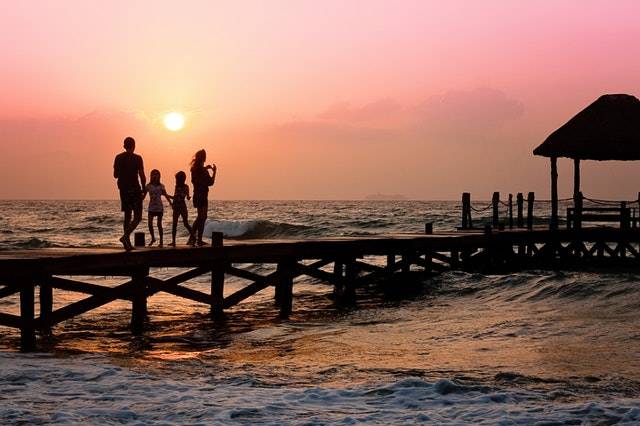The saying that education is limitless is true to the brim. What’s more, education is not bound to classroom settings only. The whole world is in itself a learning place. This explains the latest trend in education, such as home-schooling or unschooling. Of recent time, ‘World Schooling’ has become the in-thing for the modern family. It has been taken up by parents of contemporary time, and it has undoubtedly provided an enjoyable experience to their children.
World Schooling, as the name denotes, is a form of self-directed learning that traverses the narrow classroom setting and takes on the active world. It is facilitated through traveling. Modern families are increasingly taking up this new form of education by traveling more often with their children. They set aside some finances that are solely meant to fulfill this endeavor.
This article will consider how World Schooling Parents are educating their kids effectively by traveling the world.
The teacher that is nature
All children have the innate wish to explore the world. They have a deep-seated curiosity that moves them to learn the things that are in their surroundings. When these children are allowed to explore other interests that are outside the boundaries of a classroom, they are bound to be smarter and sharper than their counterparts who confine themselves to classrooms. In fact, it is always observed that they develop a strong sense of purpose in life by themselves. They are also highly self-motivated and are always confident in their abilities.
The notion of nature being the best teacher is the premise of world schooling. It is further informed by the tendency of children to be curious. This is what has inspired parents and children alike to revisit their stance on everything they experience in their daily lives. They take matters with a more in-depth perspective that’s not based on the standards of others.

When analyzed objectively, World Schooling enables children to understand what they are taught in class better. Take an example of geography. The geographical ideas taught in class, say, rock and soil formation can be better grasped if the students go on the ground to see the actual rocks and soils at their different stages of formation. In this sense, what they learn is indeed what they have seen. They get to learn in a first-hand way and in a hands-on way.
In contrast to the textbook approach to learning, the kids ingrain the concepts better as opposed to contextual nature of textbook learning.
It is no wonder we hear stories of people who went for supposed trips with their children to some country. But as time went by, they developed the tendency to travel further to other destinations in their bid to learn different aspects of communities and the whole world in general.
What world schooling really entails
As established, World Schooling is enhanced by traveling. But it should be noted that going for a trip is not purely what is meant by world schooling. Take an example of a parent who has taken their kid for a month’s trip and the kid gets back home to the same old routine of waking up and going to their usual classroom. Would this child really be world schooled?
For sure it would make more sense if the child was taken around the world for say a year. This is ample time for them to learn more cultures, have new experiences, learn new ideals and philosophies, have unique perspectives on things and also build their personality and character. But even a year is not that long. World Schooling should have a long-term horizon. Even home educators can attest to this as most of them find that even a two year’s trip was not really that great of an experience.
In fact, they considered such short trips as just avenues where children can do nothing related to school. The premise here is to have a long-term horizon when it comes to World Schooling. The travels should be much longer so that the experience is exhilarating as well as educative.

The age of digital travelers
In contemporary professional circles, some people have come to be known as virtual workers. They provide virtual services and products. Computers and smartphones purely facilitate their work. They neither have to be in a physical place nor meet you physically to perform their services and offer their products. They can utilize any relevant web site or platform to ply their trade.
If you’ve heard of virtual administrative assistants, freelance writers, bloggers among many others, then you have an idea of what digital travel is. Such people could be working for a client who is located miles away, say, even in a different continent. They do this from the convenience of their homes. In a way, this makes them virtually travel the world.
Concerning ‘World Schooling,’ children too can travel the world digitally. They can learn over the internet and interact with as many different cultures. They can take part in activities that relate to other people’s customs all in a virtual realm.
They can also be taught the different facets of education around the world by receiving instruction from online educators and virtual learning institutions around the world.
Our position
World Schooling is education that’s based. Any connection to school and mainstream classes makes it null and pointless. This form of education should integrate both active learning and travel for it to be efficacious. The facilitator should be the parent as opposed to teachers.
The bottom line
World Schooling is, by all means, an excellent approach to learning especially in modern day times where there are many enablers. Travel and technology are a significant part of this process. Activities that revolve around World Schooling include visiting museums, libraries, markets, temples, ancient monuments, hotels, subway stations, playgrounds, etc. Over 50% of youth are actively engaging in this form of travel.
For the facilitators (the parents), the journey should start even before the actual travel. It is always expected that the parent would have done initial research to gather knowledge about different destinations and what their kids would have to learn from them. It could be as easy as watching YouTube videos of say, the Great Wall of China before you embark on the journey to China to view it. This will let you give the children something to anticipate and look forward to on the trip. It would create a heightened sense of interest in them, and they would actually be psyched up for the journey.
The aspects highlighted above show why parents are increasingly educating their children through travel and World Schooling. You can use the above sentiments to culture yourself to World Schooling by traveling the world.


